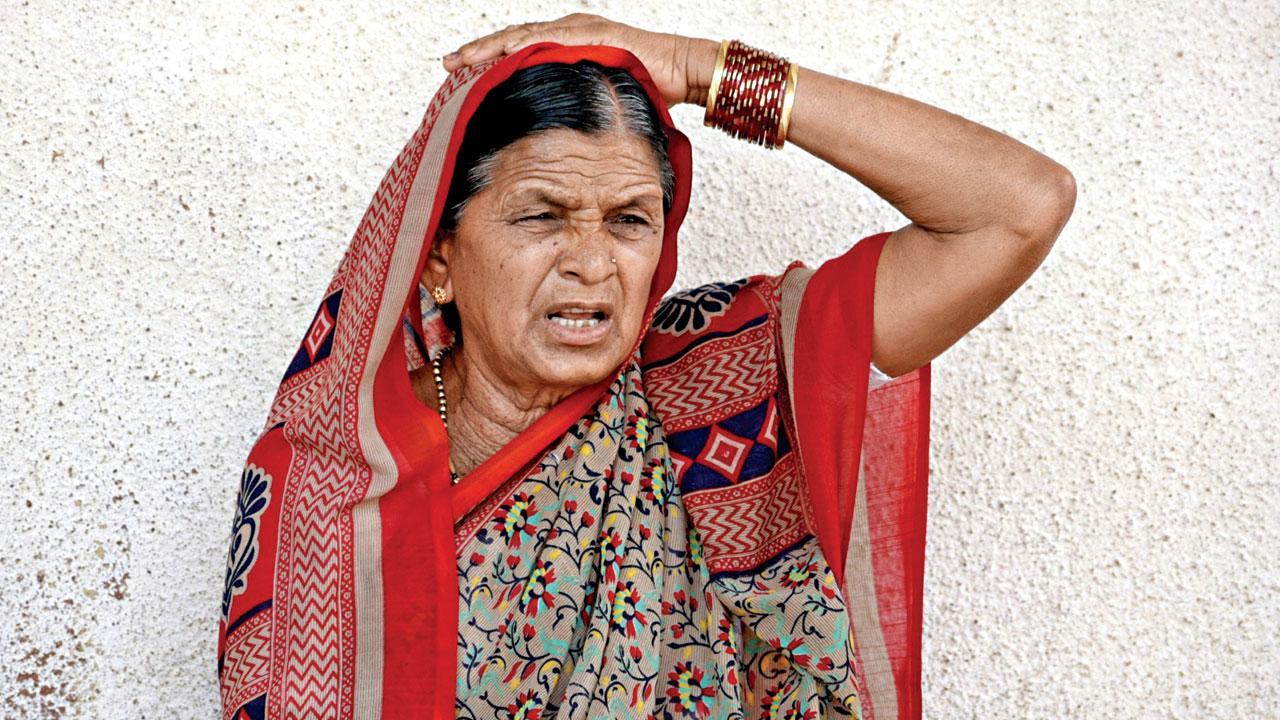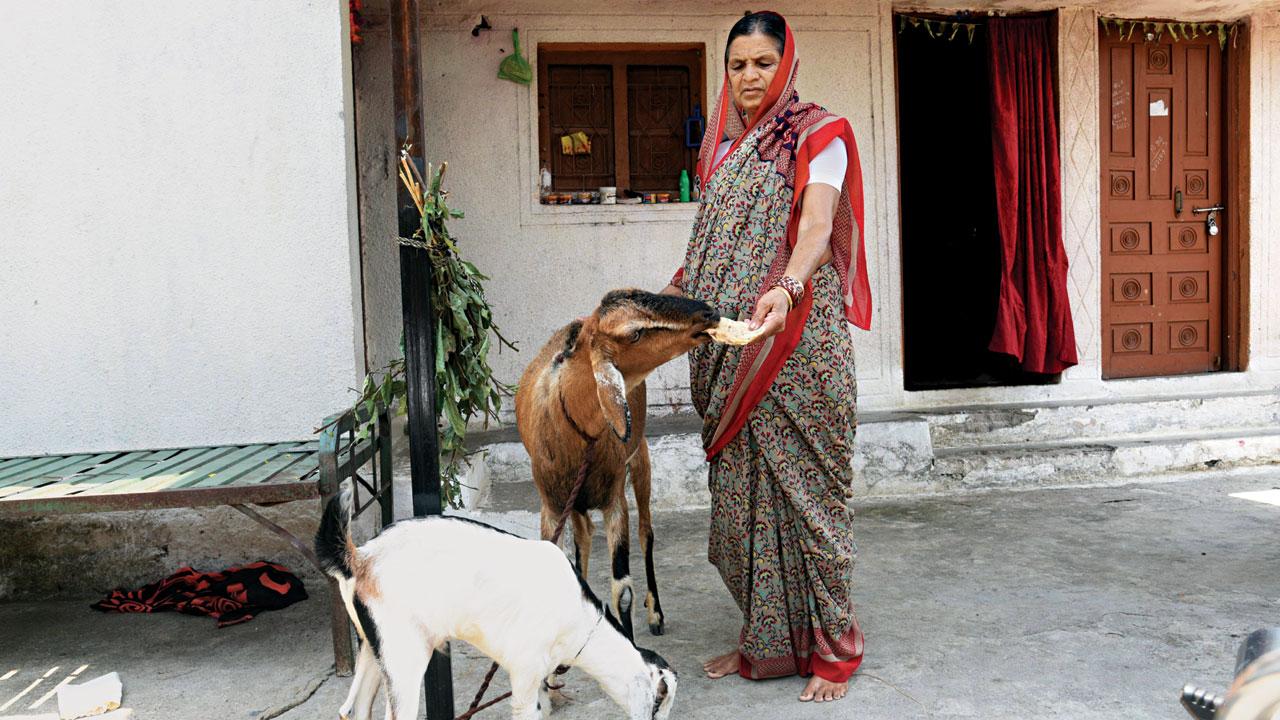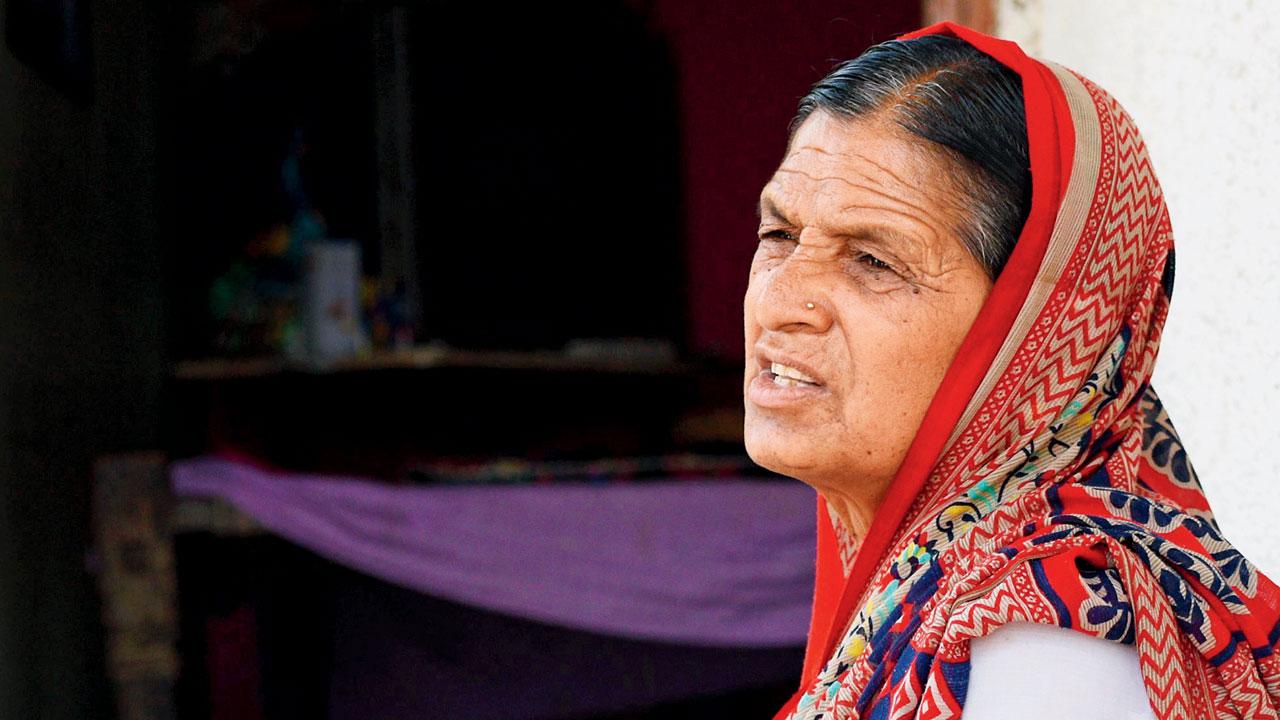Kalavati Bandurkar, face of Vidarbha’s agrarian crisis in 2008 after husband’s suicide, says farmers’ plight unchanged since 2014

Kalavati Bandurkar. Pics/Satej Shinde
Just over a hundred kilometres from the main Yavatmal highway lies the nondescript village of Jalka. It is home to farm widow Kalavati Bandurkar, 64, who became the face of Vidarbha’s agrarian crisis in 2008, following a visit to her home by Congress leader Rahul Gandhi. Since then, the resident of Maregaon taluka has remained a focal point during subsequent elections.
Kalavati still resides in the home where her husband took his own life by consuming poison due to the financial crisis 19 years ago. It has been a long and arduous journey for her since then. She single-handedly raised her nine children—seven daughters and two sons. Between 2011 and 2018, she endured the loss of one of her daughters, her son-in-law and her younger son.

Kalavati Bandurkar at her Jalka residence in Yavatmal’s Maregaon taluka on Wednesday
Speaking to mid-day, Kalavati recounted receiving financial assistance from local government bodies only after Gandhi visited her in 2008. Nonetheless, she remains disheartened by the lack of significant change in the plight of farmers in Vidarbha even 19 years after her husband's death.
Political angle
Kalavati's name resurfaced last August when, during the debate on the no-confidence motion against Prime Minister Narendra Modi, Union Home Minister Amit Shah invoked her. Shah claimed that Rahul Gandhi had attempted to kick-start his political career 13 times, beginning with Kalavati in 2008, but had failed on every occasion. He went on to claim, “It was Narendra Modi who facilitated the provision of a house, electricity, gas connections, toilets, rations, and healthcare for Kalavati. Even Kalavati, whose home you visited, trusts Modi-ji.”
Kalavati is quick to offer clarity on the matter. She asserts, “I have no personal grievances against Prime Minister Narendra Modi-ji, but it's factual that my life took a turn for the better solely because of Rahul Gandhi. It was only after he visited my home in 2008 that local authorities began mobilising, and I received financial assistance. I distinctly recall it was under the Congress government at the time.
The Modi government came into power in 2014. I recall an organisation, which I prefer not to name, persuaded me to accompany them to speak to farmers and farm widows. Without consulting me, they declared on live television that I was contesting elections on their party ticket. I declined. Yet, the BJP government came to power. How then can they claim credit for the house, electricity and assistance I received during their tenure? That's simply not true.”
Tragic incident
“My husband tragically took his own life in 2005 due to the farm and debt crisis. We were preparing for our daughter's wedding when he quietly stepped outside and ingested poison. While people talk about farmers who take their own lives to escape debts, what about the widows they leave behind? The debt passes on to her along with the responsibility of caring for the children. Between 2005 and 2008, making ends meet was a constant struggle. It was only after Rahul's visit that we received any significant help.”

Kalavati emphasises that she hasn’t received any assistance since 2014. “Initially, I received Rs 3 lakh, which I used to repair things and improve our living conditions. Another Rs 3 lakh was deposited into my account. Subsequently, I received R30 lakh from the NGO Sulabh International. I've invested this money in fixed deposits, generating a monthly interest of around R16,000. This enabled me to arrange marriages for my daughters and build a solid house,” she said.
Agrarian woes
Her son is studying in Chandrapur and aspiring to secure a job in the police force or as a forest guard. Kalavati said, “When my husband was alive, we engaged in various work and were compensated for our efforts. Now, I own three acres of land in Chandrapur, where we cultivate cotton and soya beans. However, the rising costs of seeds coupled with stagnant minimum support prices for crops result in minimal profits, and often, losses. This season, despite spending around Rs 1.20 lakh on seeds and management, we barely earned Rs 70,000 to Rs 80,000. Even with the interest from the fixed deposits, saving anything substantial is challenging.”
The high expenses associated with seeds and maintenance, juxtaposed with meagre returns, are pushing many farmers into debt. Kalavati laments that this plight is shared by the majority of farmers in Vidarbha. Jalka falls within the Chandrapur Lok Sabha constituency, although it is situated in the Yavatmal district. The constituency was the sole seat from where Congress won in 2019.
Spate of suicides
The state government’s data on farmer suicides backs Kalavati’s statements. As many as 2,851 farmers died by suicide in 2023 due to distress. The figure was 2,942 in 2022 and 2,743 in in 2021. Vidarbha had the highest number of cases (1,439), followed by Marathwada (1,088). As per the data, 318 farmers died by suicide in Amravati district, 302 in Yavatmal, 292 in Buldhana, 269 in Beed, 182 in Chhatrapati Sambhajinagar and 151 in Jalgaon.
The prevailing sentiment among farmers in Vidarbha is discontent and anger. Especially with PM Modi’s 2014 promise ahead of elections to implement the Swaminathan Committee’s recommendations, which are yet to be fulfilled even after two elections. Avinash Dhawas, a cotton farmer from Korpana village near Chandrapur, lamented the significant losses incurred due to crop destruction. “I hope whichever government comes, they secure better prices for cotton and tur. We are facing a lot of issues due to unseasonal rains, floods and other climate issues,” he said, acknowledging the persistent challenges faced by farmers.
Another farmer from Yavatmal, Gyandev Chaudhary, expressed, “Agriculture is our only source of livelihood. Expenses are increasing each year, so we take loans to invest money in seeds and raw materials such as fertiliser. But the amount we get for our produce is very low. This won’t work every time. I appeal to the government to prioritise farmer-centric policy issues, or else they will incur the wrath of farmers and suffer greatly.”
Under the leadership of Dr Swaminathan, the National Commission on Farmers (NCF) was established in 2004. Between 2004 and 2006, the commission produced five reports offering recommendations aimed at boosting the productivity, profitability and sustainability of India's primary farming systems.
Activist Speak
Vijay Jawandhia, a prominent farm activist in Vidarbha, a region plagued by India’s highest rate of farmer suicides, expressed his frustration, stating, “Politics are overshadowing farmers’ concerns. Politicians have once again failed to adequately address the pressing issues faced by Vidarbha’s soya bean and cotton-growing farmers during their recent election campaigns.” He continued, “They promise and give assurances before every election, but as soon as they come to power, everything is forgotten.”
Chronology samajhiye
Jawandhia, founder member of the Shetkari Sanghatana said, “Around 2008-2009, Dr Manmohan Singh, the former prime minister, visited Vidarbha. That was when he realised that the gap between urban and rural economies was increasing. Due to global low prices, the distress among farmers and farming increased, leading to debt, and the number of suicides started increasing across the country. Dr Singh agreed that there was a need to pump money into the rural economy at the earliest. And MNREGA was started. In the first budget after that, Rs 40,000 crore was sanctioned for MNREGA of the total budget of Rs 10 lakh crores.
Then a loan waiver worth Rs 70,000 crore was given to farmers across the country. Interestingly, that was the time when the first and the last time MSP of crops was increased from 28 per cent to 50 per cent in a year. He almost reached the recommendation. However, after the UPA II government came to power, things took a backseat, as everyone started raising objections to the increase in MSP, citing this would lead to inflation. Then gradually distress among farmers started growing again. The BJP made this their election agenda and raised slogans like ‘Mare Jawan.. Mare kisaan’.”
He continued, “In 2014, the NDA came to power, and almost within a year, they submitted an affidavit in the Supreme Court stating they could not raise the price like this; it would adversely affect the economy. Modi has not fulfilled his promises. Farmers have been deceived for the past 10 years. It was only after they lost power in Madhya Pradesh, Chhattisgarh and Rajasthan that they introduced PM Kisan Samman Nidhi. Now, this election they are not even mentioning increasing MSP.”
Jawandhia remarked that the region lacks job opportunities due to the stagnant growth in industries. Farming remains the primary option for livelihood. “Many are hesitant to marry boys involved in farming these days. Coupled with poverty, the challenges for farmers are only escalating,” he added.
2005
Year Kalavati’s husband ended his life
 Subscribe today by clicking the link and stay updated with the latest news!" Click here!
Subscribe today by clicking the link and stay updated with the latest news!" Click here!










